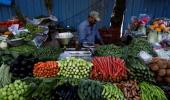India's exports rose by 2.14 per cent to $36.27 billion in July while the trade deficit almost tripled to $30 billion during the month due to over 70 per cent rise in crude oil imports, according to official data released on Friday.

Imports shot up by 43.61 per cent to $66.27 billion in the month compared to July 2021, the data showed.
The trade deficit was $10.63 billion in July 2021.
Preliminary data released earlier this month had shown a 0.76 per cent contraction in exports at $35.24 billion for July.
However, exports during April-July 2022-23 rose by 20.13 per cent to $157.44 billion. Imports during the four months increased by 48.12 per cent to $256.43 billion.
The trade deficit stood at $98.99 billion as against $42 billion during April-July 2021-22.
Imports of crude and petroleum products during July this year were $21.13 billion, up 70.4 per cent compared to $12.4 billion in July 2021.
Imports of coal, coke and briquettes shot up more than twofold to $5.2 billion while that of vegetable oil rose 47.18 per cent to $2 billion in July this year.
Inbound shipments of gold, however, declined by 43.6 per cent to $2.37 billion compared to 4.2 billion in July 2021.
Exports of engineering goods; petroleum products; gems and jewellery; and drugs and pharmaceuticals, contracted in July 2022 year-on-year.
On the export front, sectors which recorded positive growth include petroleum products, leather, electronic goods, and coffee.
Engineering, gems and jewellery, plastic, cashew and carpet segments witnessed a fall.
According to the data, the estimated value of services export for July 2022 is $24.91 billion, exhibiting a positive growth of 28.69 per cent year-on-year. Imports are estimated at $15.95 billion, a growth of 40.02 per cent.
Federation of Indian Export Organisations president A Sakthivel said that signs of a likely slowdown in exports can be seen as global inventories are pretty high and the merchandise exports are facing a triple whammy.
"There is again a shift in consumption from goods to the services with opening up of economies after Covid-19 pandemic; the inflation affecting all economies reducing the purchasing power and many economies entering the recession while some advanced ones already in recession," he said.











 © 2025
© 2025